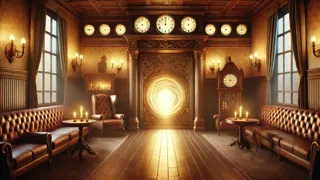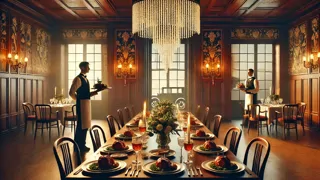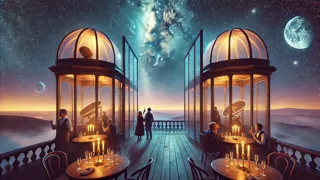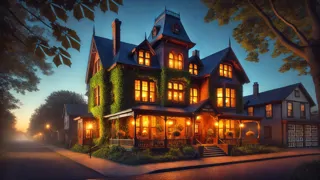Introduction
Tucked away on a tree-lined lane in a quiet corner of the United States, the Time Travel Inn appears at first glance to be a perfectly ordinary boutique bed and breakfast. Its brick façade, festooned with climbing ivy and warm lantern light, casts a welcoming glow beneath the twilight sky. To the passerby, it seems little more than a restored Victorian house offering elegant rooms and the aroma of freshly baked bread. Yet within these walls, subtle anomalies whisper to the observant guest: clocks that pause and hesitate, wallpaper patterns that flicker between decades, and the faint hum of unseen machinery. It is here, amid plush armchairs and polished wood floors, that travelers find themselves drawn toward a heavy door at the far end of the lobby. Ornate carvings swirl in patterns that shift when no one is watching, and the brass handle feels neither cold nor warm but somehow alive to the touch. For those brave enough to turn it, the portal beyond leads not just to another room of the Inn but to moments lost in time—a jazz-filled parlor of the Roaring Twenties, a candlelit corridor in medieval Europe, or a sleek chamber glimpsed through the haze of tomorrow. Every step through these thresholds reshapes memory, teaching perseverance in the face of the unknown. Guests soon learn that the true luxury of the Time Travel Inn is not found in silk sheets or gourmet breakfasts, but in the chance to walk between eras, to collect memories that transcend the ordinary rhythms of life, and to return changed, wiser, and ever more curious about the vast tapestry of human experience.
A Door Between Eras
Emily Parker stepped into the lobby of the Time Travel Inn late that evening, her suitcase wheels whispering against the polished oak floor. The scent of fresh lavender and old leather greeted her as her eyes roamed the walls lined with antique clocks each ticking in graceful dissonance. She noticed how the air felt charged with possibility, a gentle vibration that made the skin on her arms tingle. Behind the reception desk, the innkeeper Henry Talbot smiled knowingly, as though expecting her arrival for decades. He offered her a steaming cup of chamomile tea and a map of the house, marking rooms that officially belonged to different centuries. Yet when Emily peered at the curious glyphs etched beneath the door frames, she felt certain they were more than mere decoration.

Drawing closer to the far wall, Emily discovered a grand door carved with swirling motifs that seemed to shift under her gaze. Brass inlay traced constellations that had not been charted for centuries, and the handle shivered beneath her hand. Compelled by a mixture of excitement and apprehension, she turned it and pushed the door open. A rush of cold air and distant laughter spilled out, as though she had cracked open a window into another life. Beyond, the hallway glimmered with lamplight, and wood-paneled walls bore tapestries of knights and starships in the same breath, blending past and future with uncanny grace.
Heart pounding, Emily crossed the threshold. The wallpaper changed texture beneath her fingertips, the dim glow from a chandelier overhead seemed to hum a forgotten tune, and she felt the weight of years shift all around her. As she took a cautious step forward, Henry’s voice echoed from behind the door: "Dinner in the parlor at seven. And Emily, I promise you, this is just the beginning." She closed her eyes, inhaled the mingled scents of soot and ozone, and followed the call of time itself.
Echoes from Yesterday
When the dinner bell rang, Emily followed Henry into a dining room that felt plucked from the 1920s. Rich mahogany paneling gleamed beneath crystal chandeliers, and servers in art deco uniforms presented platters of roast and fine Bordeaux. Outside the tall windows, the world circled forward—cars cruised past in modern shapes—yet here time had paused in a swirling dance of cello music and candle flame. With each course, Emily tasted notes of a past she had never known. The wallpaper slipped between floral print and sleek minimalism at the corner of her eye, revealing how the Inn’s layers of design folded eras together.

Between the main course and dessert, the candles sputtered and the air grew crisp. A hush fell over the table as Henry excused himself, and in his place, a pianist began playing ragtime with modern jazz inflections. Emily’s pulse quickened as the melody unraveled. She realized the Inn was not only a portal but a curator of moments, blending memory and imagination into every fixture, every brushstroke of paint.
After coffee and a slice of pear cake, Henry guided Emily to a concealed panel beside the fireplace. With a soft click, it opened onto a narrow stairwell spiraling upward in candlelight. The steps felt uneven, as if they had been walked by hands from centuries apart. At the top, she stepped into a small gallery where portraits shifted between charcoal sketches and three-dimensional holograms. Faces from medieval courts smiled beside future avatars with soft glowing visages. A plaque read simply: "Every face you see here belonged to someone who dared to cross time. What story will you leave behind?"
As Emily gazed into a frame, the reflection that stared back was not her own but a composite of countless travelers: explorers, dreamers, seekers of truth. It filled her with the profound realization that history is not fixed, but shaped by those brave enough to step through unknown doors. With renewed resolve, she descended back to the parlor, where the scent of tobacco and old books beckoned her onward.
Horizons of Tomorrow
The following morning, Emily rose at dawn and wandered into the sunlight-drenched garden. Stone statues of mythic heroes stood alongside sleek sculptures of futuristic shapes, their shadows cast under the gentle warmth of Golden Hour light. A small plaque beside one sculpture read: "Tomorrow is an echo waiting to be heard." As she traced her fingers along the smooth metal curves, the air tingled with energy, and she realized that time here was alive, not inert.

Back inside, Henry escorted her to the final room at the end of an arched corridor lined with mirrors reflecting shifting skies. The door swung open to reveal a chamber illuminated by soft neon veins pulsing beneath translucent walls. It felt like stepping into a dream of tomorrow—holographic panels danced across the floor, mapping cityscapes not yet built. Streams of ambient data flowed through the air like digital winds. The bed was covered in crisp linens embossed with constellations, and a cluster of tiny lights floated overhead like stars.
Emily perched on the edge and watched the horizon beyond the window morph from a sunrise to the glow of distant pulsars. The room’s technology responded to her heartbeat, shifting colors from tranquil blues to vibrant purples as she breathed. It was the ultimate expression of what Henry called "Temporal Hospitality"—a space designed to attune the traveler to both the past they carried and the future they might shape.
On her final evening, guests gathered for a toast in the rooftop observatory. Glass panels opened to reveal the night sky unfiltered by city lights, and the Milky Way shimmered with ancient brilliance. Henry raised a glass of sparkling wine and said, "To journeys without end and the courage to turn every doorknob." Clinking glasses against the sound of cosmic silence, Emily felt the inn’s promise fulfilled: that perseverance through time would not only reveal the secrets of yesterday and tomorrow but unlock the infinite potential of today.
Conclusion
On her departure, Emily gathered her belongings with a new sense of wonder woven into every fabric of her memory. The front door closed softly behind her as she stepped onto the quiet lane, leaving the Time Travel Inn’s lanterns glowing in the distance. In her hand, she carried a small keepsake—an ornate key inscribed with shifting glyphs—a reminder that time is not a straight line but a vast tapestry of moments accessible to those with courage and curiosity. As her taxi pulled away, she glanced back to see the inn’s outline morph, its windows reflecting eras she had visited and those she had yet to explore. She realized that the world beyond the Inn held a new dimension of possibility: every choice could open a door, every memory could change the narrative, and every traveler was an architect of time itself. With that revelation burning bright, Emily stepped into the flow of her own era, forever transformed by the journeys she had taken and the promise of adventures still to come.


















